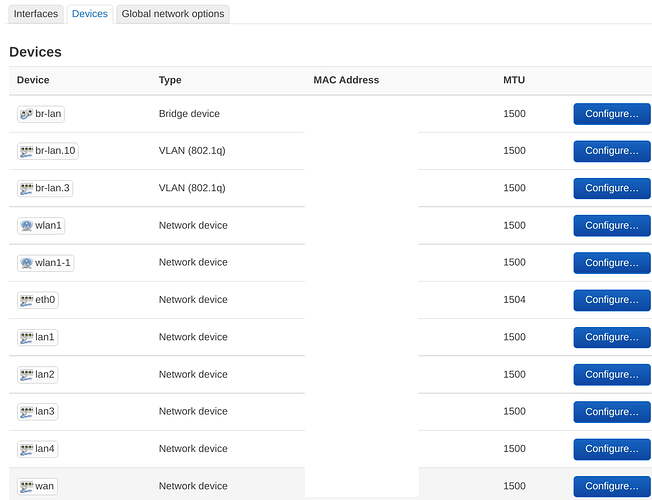eth0 is consistent on mine... not sure if it's "right" though.
I have the same but not sure if right, got a fiber connection
This is from wikipedia:
The IP MTU and Ethernet maximum frame size are configured separately. In Ethernet switch configuration, MTU may refer to Ethernet maximum frame size. In Ethernet-based routers, MTU normally refers to the IP MTU. If jumbo frames are allowed in a network, the IP MTU should also be adjusted upwards to take advantage of this.
Since the IP packet is carried by an Ethernet frame, the Ethernet frame has to be larger than the IP packet. With the normal untagged Ethernet frame overhead of 18 bytes, the Ethernet maximum frame size is 1518 bytes. If a 1500 byte IP packet is to be carried over a tagged Ethernet connection, the Ethernet frame maximum size needs to be 1522 due to the larger size of an 802.1Q tagged frame. 802.3ac increases the standard Ethernet maximum frame size to accommodate this.
If MTU really means MTU in Openwrt how can it be bigger than 1500?
Wasn't there something DSA-related that on some devices (probably the CPU port intp the switch?) results in a larger apparent MTU in the device section? Some sort of data tag required for DSA. On my recent snapshot I see 1508 for eth0...
Good evening @darksky!
The new leads I use are as follows, purchased on Amazon: https://www.amazon.com/gp/product/B07MM88N6J/ref=ppx_yo_dt_b_asin_title_o00_s02?ie=UTF8&psc=1
In terms of performance (remembering I'm in a pretty adverse environment: condo, many FIOS routers around me, etc... at a little over 20 yards, I was at about 60-70Mbps with my TP-Link Archer C1900, 100-120Mbps with the RT3200 stock, and 150-170Mbps with RT3200 with the new antennas/leads.
Have others been experiencing sudden drops of WiFi connectivity on the RT3200? I started a new thread to keep this one a bit more tidy. Would appreciate any comments/suggestions/insights in the new thread.
No. My E8450 is running with learning enabled for now. Monitoring for issues.
Edit: Previously I tried add the wan port to br-lan and set it up with vid 2, with lan as 1. It’s not stable. I’ll loose IPv6 wan after a while. But that without the recent VLAN patches. So my E8450 is setup with vlan filtering for lan ports and bridge only.
Is it me or OpenWRT on this router, gives you mixed speed?
I tried the cake script, was getting a whopping 3mbps. then I try software AND hardware offloading with IRQ enabled both times (IRQ and cake, fyi). was okayish, getting around 400mbps. now no matter what I do, the speed is always slow. with the cake script or without. IRQ doesn't seem to help, well, not sure if it does at all.
I was testing with the waveform buffer bloat, with cake/sqm it would never go above 80mbps but on a speedtest site it was maxed out at 400mbps. I have a unlimited 1gbps line.
I tried with just packet sheering, IRQ and software offloading and it was around 500mbps. added hardware to that made no difference.
I purchased this router because it was recommended, now I'm starting to think it was £90 waste.
Thoughts?
How are you hitting 1gbps with cake? Enlighten us. ![]()
what is your connexion ? please give precision ![]()
I put below in startup script and testing. Hopefully this will resolve the wifi issue.
echo 0 > /sys/kernel/debug/ieee80211/phy0/aql_enable
echo 0 > /sys/kernel/debug/ieee80211/phy1/aql_enable
Hi @darksky we are already trying to collect "no connectivity" case in this thread no connectiviy issue thread.
Did you try SW and HW offloading with firewall4, only nftables and iptables removed? Think you can't run QoS then though.
1gbps. with the cake script, I get a max of 400/500mbps.
is normal cpu max 500 with cake
witouth cake 1gbits
Please try this patch
patch
--- a/drivers/net/dsa/mt7530.c
+++ b/drivers/net/dsa/mt7530.c
@@ -1193,7 +1193,7 @@ mt7530_port_bridge_join(struct dsa_switch *ds, int port,
PCR_MATRIX_MASK, PCR_MATRIX(port_bitmap));
priv->ports[port].pm |= PCR_MATRIX(port_bitmap);
- mt7530_clear(priv, MT7530_PSC_P(port), SA_DIS);
+ mt7530_rmw(priv, MT7530_PSC_P(port), SA_CNT_EN, MAC_SA_LRN);
/* Set to fallback mode for independent VLAN learning */
mt7530_rmw(priv, MT7530_PCR_P(port), PCR_PORT_VLAN_MASK,
@@ -1300,7 +1300,7 @@ mt7530_port_bridge_leave(struct dsa_switch *ds, int port,
PCR_MATRIX(BIT(MT7530_CPU_PORT)));
priv->ports[port].pm = PCR_MATRIX(BIT(MT7530_CPU_PORT));
- mt7530_set(priv, MT7530_PSC_P(port), SA_DIS);
+ mt7530_rmw(priv, MT7530_PSC_P(port), MAC_SA_LRN, SA_CNT_EN);
/* When a port is removed from the bridge, the port would be set up
* back to the default as is at initial boot which is a VLAN-unaware
@@ -2714,7 +2714,7 @@ mt7530_setup(struct dsa_switch *ds)
PCR_MATRIX_CLR);
/* Disable learning by default on all ports */
- mt7530_set(priv, MT7530_PSC_P(i), SA_DIS);
+ mt7530_rmw(priv, MT7530_PSC_P(i), MAC_SA_LRN, SA_CNT_EN);
if (dsa_is_cpu_port(ds, i)) {
ret = mt753x_cpu_port_enable(ds, i);
@@ -2887,7 +2887,7 @@ mt7531_setup(struct dsa_switch *ds)
PCR_MATRIX_CLR);
/* Disable learning by default on all ports */
- mt7530_set(priv, MT7530_PSC_P(i), SA_DIS);
+ mt7530_rmw(priv, MT7530_PSC_P(i), MAC_SA_LRN, SA_CNT_EN);
mt7530_set(priv, MT7531_DBG_CNT(i), MT7531_DIS_CLR);
--- a/drivers/net/dsa/mt7530.h
+++ b/drivers/net/dsa/mt7530.h
@@ -294,6 +294,8 @@ enum mt7530_port_mode {
/* Register for port security control */
#define MT7530_PSC_P(x) (0x200c + ((x) * 0x100))
+#define MAC_SA_LRN GENMASK(19, 8)
+#define SA_CNT_EN BIT(5)
#define SA_DIS BIT(4)
/* Register for port vlan control */
Instead of setting SA_DIS, this enables address learning counter SA_CNT_EN and sets the limit MAC_SA_LRN to 0.
How did you get 1gbps with cake above, then?
Isn’t this effectively does the same thing?
Edit: Forgot to add that I think the issue is likely with the CPU port. When I tried to upload to router, only the LAN ports and the CPU port is involved. The LAN ports being bridged will have learning enabled, while the CPU port is disabled. One of the LAN port is at 10mbps, one at 1000mbps while the other two is disconnected. This resulted in the client to bridge direction sped stuck at 10mbps.
In any case, I’m not convinced that the switch should disable address learning on its own. It is purpose built for such a task.

